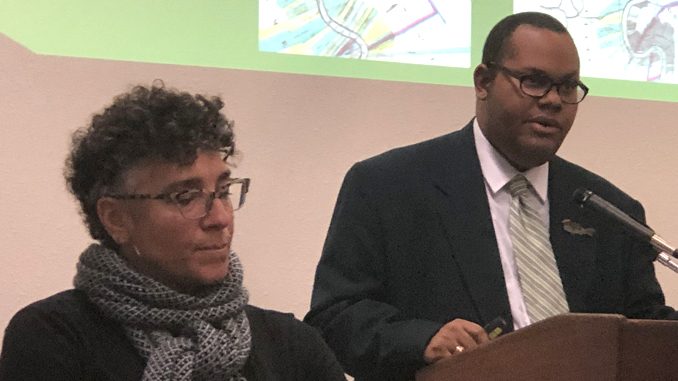
By Kelsyn Parker
Data News Weekly Contributor
Time flies by and memories are often forgotten, however a historical footprint left behind by ancestors leave a rich history of their roots that still thrives today. Documentation of their past grants today’s society an all access pass to their origins. Historian Wendy Gaudin and Professional Genealogist Jari Honora dissected Gaudin’s Creole Heritage at a public lecture on Feb. 19, 2019 for the exhibit: “Purchased Lives: The American Slave Trade from 1808 to 1865.”
The travelling exhibit that spanned six weeks and ends on Feb. 28th allowed the public to consider the lived experiences of enslaved Africans in the United States for Black History Month.
On Feb. 26th, the exhibit hosted its final installment of the lecture series, “Reclaiming African- American Legacies and the Human Spirit.” The lecture highlighted recent projects on African-American History in the Greater New Orleans area. The exhibit was housed for public viewing at Xavier’s Library on its 6th floor.
Honora shared the importance of retracing the roots of ordinary citizens in the Black community. “Genealogy is the study of all the individuals who contributed to making the people we are,” Honora said. “The documentation of our ancestors’ cultural practices, nomenclature, and linguistics are all integral to unveiling who we are deep inside,” he added.
Capturing the past is key to reconnecting the bloodline of the African-American Community, Honora reminded the audience. It was not unusual for descendants of slaves to slightly change their given last names for multiple purposes, he explained. A change of a last name might initially indicate a disconnect from heritage, but this is not the case at all with documentation, which will show what the original name after a change of last name. Records from the past, such as birth certificates, death certificates, marriage certificates, and even photographs all offer clues to the mystery of who African- Americans are and where they come from, he said.
“The case of Dr. Gaudin is an interesting one,” Honora said. “She’s done extensive, independent research to find out more information about her ancestry. The fact that she moved from California to New Orleans, where her ancestors are from, to further her knowledge shows that more and more people are getting in touch with their roots,” he added.
The purpose of genealogy serves more than just unveiling the past. It allows researchers to feel a sense of pride and confidence.
“Knowing your family’s legacy is an art of celebration and inclusion,” Gaudin told the audience as she dissected her family’s origins with documentation of their story that she has uncovered from Tulane University and family photos that were handed down to her. She added that knowing the history of her family amazes her as it gives her the feeling of fulfillment.
“Purchased Lives has given me the opportunity to tell my story of discovering my background,” Gaudin said, encouraging the audience to engage in research about their genealogy.
Recommended For You.
















Be the first to comment